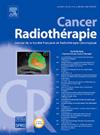乳腺癌肿瘤委员会:哪些患者符合放疗降级或省略的条件?
IF 1.4
4区 医学
Q4 ONCOLOGY
引用次数: 0
摘要
保守性手术后辅助放疗是浸润性乳腺癌的标准治疗方法,可降低局部复发风险和远期死亡率。然而,肿瘤生物学的进步和分子特征的出现已经确定了复发风险非常低的亚群,特别是腔a癌患者,这重新引发了对这一人群中潜在的放疗降级的争论。此外,在接受新辅助化疗的患者中获得完全的病理反应表明适应放疗指征的可能性。本文旨在介绍目前可获得的主要数据,包括保守手术后腔内A型乳腺癌省略放疗的治疗,以及正在进行的新辅助化疗后完全病理反应的照射降级试验,特别是cN1-ypN0和cN2-3-ypN0亚型。一些前瞻性研究和随机试验,包括LUMINA, PRIME II和使用基因组特征(POLAR, Oncotype DX®,Prosigna®)的试验,表明对一些极低风险患者省略放疗的可行性,而对总生存期没有证明的影响。然而,局部控制的持续效益已经被观察到。国家外科辅助乳腺和肠项目(NSABP)-B51/放射治疗肿瘤组(RTOG) 1304试验和原发性化疗后放疗(RAPCHEM)注册显示,在完全淋巴结病理反应(ypN0)后,可以考虑省略淋巴结放疗,具有良好的短期局部区域控制,尽管明确的长期结果尚未报道。预后良好的乳腺癌患者,特别是腔内a肿瘤患者和新辅助治疗后完全缓解的患者,不进行放疗,代表了治疗降级的有希望的途径。然而,它必须根据严格的生物学和临床选择标准来确定,并通过长期对照试验进行验证。本文章由计算机程序翻译,如有差异,请以英文原文为准。
Breast cancer tumour board: Which patients are eligible for radiotherapy de-escalation or omission?
Adjuvant radiotherapy after conservative surgery is the standard treatment for invasive breast cancer, showing reduced risk of local recurrence and long-term mortality. However, advances in tumour biology and the emergence of molecular signatures have identified subgroups with a very low risk of recurrence, particularly patients with luminal A cancers, reigniting the debate on potential radiotherapy de-escalation in this population. In addition, achieving a complete pathological response in patients who have received neoadjuvant chemotherapy suggests the possibility of adapting radiotherapy indications. This article aimed to present the major currently available data on the omission of radiotherapy in the treatment of luminal A phenotype breast cancers after conservative surgery, as well as ongoing trials on irradiation de-escalation in cases of complete pathological response after neoadjuvant chemotherapy, particularly for the cN1–ypN0 and cN2–3–ypN0 subtypes. Several prospective studies and randomized trials, including LUMINA, PRIME II, and trials using genomic signatures (POLAR, Oncotype DX®, Prosigna®), suggest the feasibility of omitting radiotherapy for some very low-risk patients, without demonstrated effects on overall survival. However, the persistent benefit of local control has been observed. The National Surgical Adjuvant Breast and Bowel Project (NSABP)-B51/Radiation Therapy Oncology Group (RTOG) 1304 trial and Radiotherapy After Primary Chemotherapy (RAPCHEM) registry showed that the omission of nodal radiotherapy could be considered after a complete nodal pathological response (ypN0), with good short-term locoregional control, although definitive long-term results have not been reported. The omission of radiotherapy for breast cancers with a good prognosis, particularly in patients with luminal A tumours and those with a complete response after neoadjuvant treatment, represents a promising avenue for therapeutic de-escalation. However, it must be determined based on strict biological and clinical selection criteria and validated via long-term controlled trials.
求助全文
通过发布文献求助,成功后即可免费获取论文全文。
去求助
来源期刊

Cancer Radiotherapie
医学-核医学
CiteScore
2.20
自引率
23.10%
发文量
129
审稿时长
63 days
期刊介绍:
Cancer/radiothérapie se veut d''abord et avant tout un organe francophone de publication des travaux de recherche en radiothérapie. La revue a pour objectif de diffuser les informations majeures sur les travaux de recherche en cancérologie et tout ce qui touche de près ou de loin au traitement du cancer par les radiations : technologie, radiophysique, radiobiologie et radiothérapie clinique.
 求助内容:
求助内容: 应助结果提醒方式:
应助结果提醒方式:


